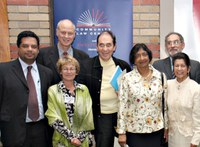Constitution reform: the latest trend in Africa
22 April 2013: A number of countries in Africa are undergoing constitution-making processes. Some countries like Zimbabwe, South Sudan are in the process of writing or adopting a constitution, and others like Kenya have recently adopted a new constitution and are in the process of implementing it.
According to the Community Law Centre at the University of the Western Cape (UWC), once a new constitution has been adopted, the real challenge lies in implementing the new framework. “Almost always, this involves a landmark general election, followed by large scale reforms of statutory frameworks, policies and institutions right across the country.
Key issues in this are the political management of these reforms, how to maintain the rule of law and democratic governance, how to involve citizens and stakeholders in the reforms, how to deal with resistance, what transitional mechanisms to use,” the centre adds.
It also points out that the process towards the adoption of a constitution is determined by the context in which the constitution is written. It navigates issues such as political engagement, keeping politically agreed timelines, ensuring the inclusion of a variety of constituencies and groups, use of domestic and foreign technical expertise, ensuring legitimacy and public awareness, the centre says.
In line with this, The Multi-Level Government Initiative and the Socio-Economic Rights Project of the Community Law Centre at the University of the Western Cape (UWC), together with the South African Research Chair on Multi-Level Government, Law and Policy are inviting constitution-making experts to submit abstracts for an upcoming conference on Constitution-making in Africa. The conference is organised as part of the African Human Rights Moot Court Competition, hosted by UWC’s Faculty of Law and the University of Pretoria’s Centre for Human Rights from 2 to 7 September 2013.
According to the director of the community Law Centre, Professor Jaap De Visser, the Community Law Centre says the conference marks the 20th anniversary of the adoption of South Africa’s Interim Constitution. The Interim Constitution was the product of the negotiations between the apartheid government and the liberation movements, which had already commenced in the late 1980s. “It paved the way for the first democratic elections in 1994 and the adoption of the Final Constitution in 1996. The Community Law Centre played an important role in the drafting of the Interim and the Final Constitution and is proud to host a conference to mark the anniversary of the Interim Constitution.”
The conference will commence with a plenary session, in which key participants to the South African Constitution-making process will reflect on the transition from apartheid rule to democratic rule. “The conference aims to provide a platform for the critical engagement with current and past constitution-making processes on the continent, drawing on the comparative experience of academics and practitioners,” he adds.
For more information click HERE.
The Community Law Centre
The Community Law Centre is founded on the belief that constitutional orders must promote good governance, socio-economic development and the protection of the rights of vulnerable and disadvantaged groups. Through engaged research, engaged teaching and advocacy, the Centre supports processes in South Africa and the region to build inclusive, resilient states that are accountable to citizens and responsive to human rights. The Centre aims to be the leading think tank on multi-level governance and human rights in Africa.
Editorial contacts
Jacob Nthoiwa
Information Manager, Community Law Centre
University of the Western Cape
+27 21 959 2950
knthoiwa@uwc.ac.za

